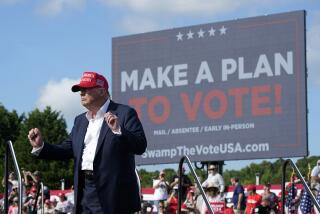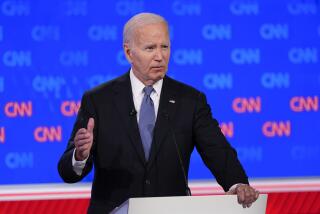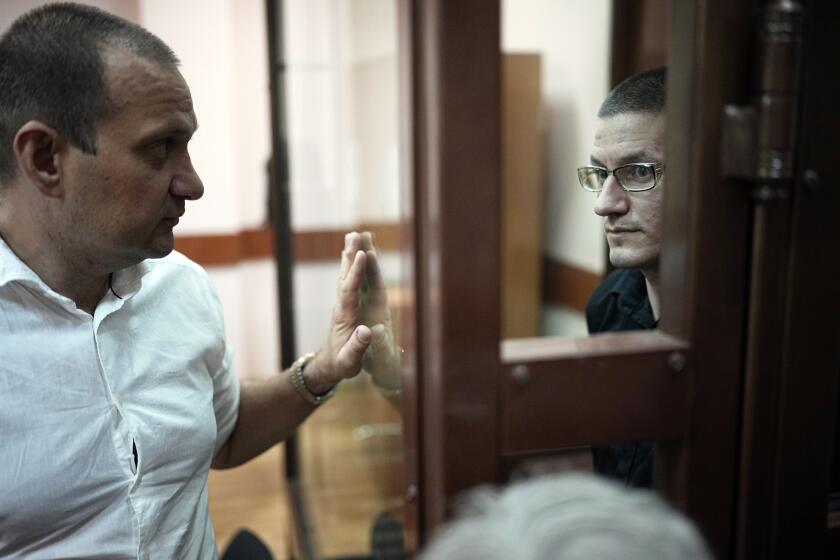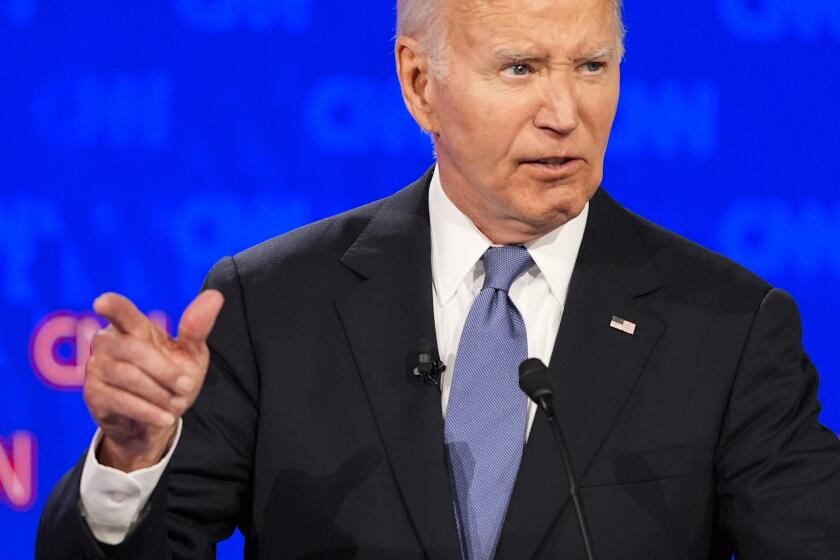U.S. Aid to Milosevic’s Foes Is Criticized as ‘Kiss of Death’
The man with the best chance of winning the struggle to drive Yugoslav President Slobodan Milosevic from power peacefully has a request for Washington: Stay out of it.
Vojislav Kostunica, an opposition candidate leading Milosevic in opinion polls in the run-up to Sept. 24 elections, complains that U.S. efforts over the years to promote Milosevic’s political enemies have only made the Yugoslav president stronger.
But Washington is pressing ahead with plans to open an office in Budapest, the capital of neighboring Hungary, to coordinate U.S. support for the opposition in Yugoslavia.
“I call this affair with the office in Budapest the kiss of death,” Kostunica, 56, said last week in an interview here.
Milosevic and his state-run media regularly attack the opposition as corrupt puppets of the U.S. and other North Atlantic Treaty Organization countries. Alliance warplanes bombed this nation for 78 days last year to drive Milosevic’s forces from Kosovo, a province of Yugoslavia’s dominant republic, Serbia.
Photos of opposition politicians meeting with Secretary of State Madeleine Albright and other U.S. diplomats have given Milosevic potent ammunition to discredit his political foes in the eyes of many Serbs.
One of the most damaging images was a picture of Vuk Draskovic, once Milosevic’s predominant rival, kissing Albright’s hand at a meeting in Europe last winter.
“Thank God these relations are not as friendly and cordial as they were before because they brought the opposition nothing,” Kostunica said, though he added that more focused European aid to opposition-run municipal governments is likely to win him votes.
By refusing to back Kostunica, Draskovic has improved Milosevic’s hopes of winning next month’s elections. Draskovic is living in self-imposed exile in Montenegro, Serbia’s weaker partner in the Yugoslav federation.
In addition, Montenegro’s pro-Western president, Milo Djukanovic, is boycotting the elections, despite pressure from Albright to participate. On Friday, his government banned the republic’s state-run media from covering the elections.
Two recent opinion polls have shown Kostunica leading with the support of as much as 35% of respondents to Milosevic’s 23%. But few here expect the Yugoslav president to allow a free and fair vote if it appears that he will lose.
Kostunica’s strategy is to deny Milosevic more than 50% of the ballots cast in the first round of voting, then go head to head against him in a runoff election. At least two other candidates are running.
A Serbian nationalist less rabid than many here, Kostunica is more of a technocrat than a politician. He finds himself up against a ruthless survivor who risks going to prison for life if defeated.
Kostunica called the indictment of Milosevic on war crimes charges toward the end of last year’s war over Kosovo “a political act” and “a very serious problem” for the opposition because it left the Yugoslav president with little to lose.
Kostunica, leader of the Democratic Party of Serbia, is coy when asked if he would hand over an ousted Milosevic to the international war crimes tribunal at The Hague, as other members of his 15-party alliance have promised to do.
“There are many things about the Hague tribunal that are more about politics than law,” Kostunica said. “With all those problems that we are facing at the moment, it is very difficult to think of Milosevic’s Hague indictment being the first matter.”
He accused some U.S. officials of conducting “some sort of private war” against Milosevic. “Because of that, we are really in the state where we are hostages--not only because of Milosevic but because of some specific decisions in American policy which I do not understand entirely.”
Kostunica believes that the Clinton administration strengthened Milosevic by demonizing him and by prolonging economic sanctions that have demoralized ordinary Serbs.
“It’s very difficult to imagine that a country of such influence and dominance in the world is so preoccupied with just one dictator in a very small country like Serbia,” he said. “To me, it’s unexplainable. But it’s enabled Milosevic to play an even larger role than he normally deserves.”
Sanctions have combined with a decade of war and economic mismanagement under Milosevic to cripple the economy. In July, industrial production in Yugoslavia was 5.3% lower than the same month in 1999, the private Economics Institute in Belgrade, the Yugoslav and Serbian capital, reported. The annual rate of inflation is running at more than 100%, according to the estimates of independent economists, and the continuing collapse of the Yugoslav dinar is likely to spark hyperinflation.
The State Department announced Aug. 15 that Albright had asked William Montgomery, the U.S. ambassador to Croatia, to head a new office of Yugoslav affairs.
The office, in the U.S. Embassy in Budapest, “will consist of State Department and [U.S. Agency for International Development] officials and will work to support the full range of democratic forces in Serbia,” the statement said.
But Washington’s effort to support the Yugoslav opposition is so sensitive that U.S. diplomats refused to discuss, on or off the record, the office’s role and budget. Nor would they say why the announcement was made just when Milosevic was intensifying attacks on the opposition for its Western links.
“It really is counterproductive,” said Kostunica, who wasn’t alone among the opposition in criticizing the U.S. move. “Directly, we can get nothing out of forming that office.”
In his effort to unseat Milosevic, Kostunica has won support from a man often dismissed by Washington as a puppet of the Yugoslav president.
“We can see the evolution of Kostunica as a politician, from a very raw politician unwilling to take criticism or to accept different opinions into an extremely tolerant, pragmatic politician who is ready to correct his opinions if needed,” said Oliver Ivanovic, a Serbian leader in Kosovo.
His “communication with the people has significantly improved, and his relations with the international community are exceptional,” said Ivanovic, who expects many Serbs in Kosovo to cast ballots in the September elections, though the overwhelming majority have refused to register for foreign-administered provincial elections scheduled for October.
Even if Milosevic wins next month’s elections, “it’s the beginning of a battle that will bring us substantial changes in Serbia,” Kostunica predicted.
Kostunica has been waiting for a decade “to see the end of Slobodan Milosevic.” Now he thinks the curtain will soon fall.
“For me, it is a matter of some months, or a year,” he said. “Not more than that.”
More to Read
Start your day right
Sign up for Essential California for news, features and recommendations from the L.A. Times and beyond in your inbox six days a week.
You may occasionally receive promotional content from the Los Angeles Times.






